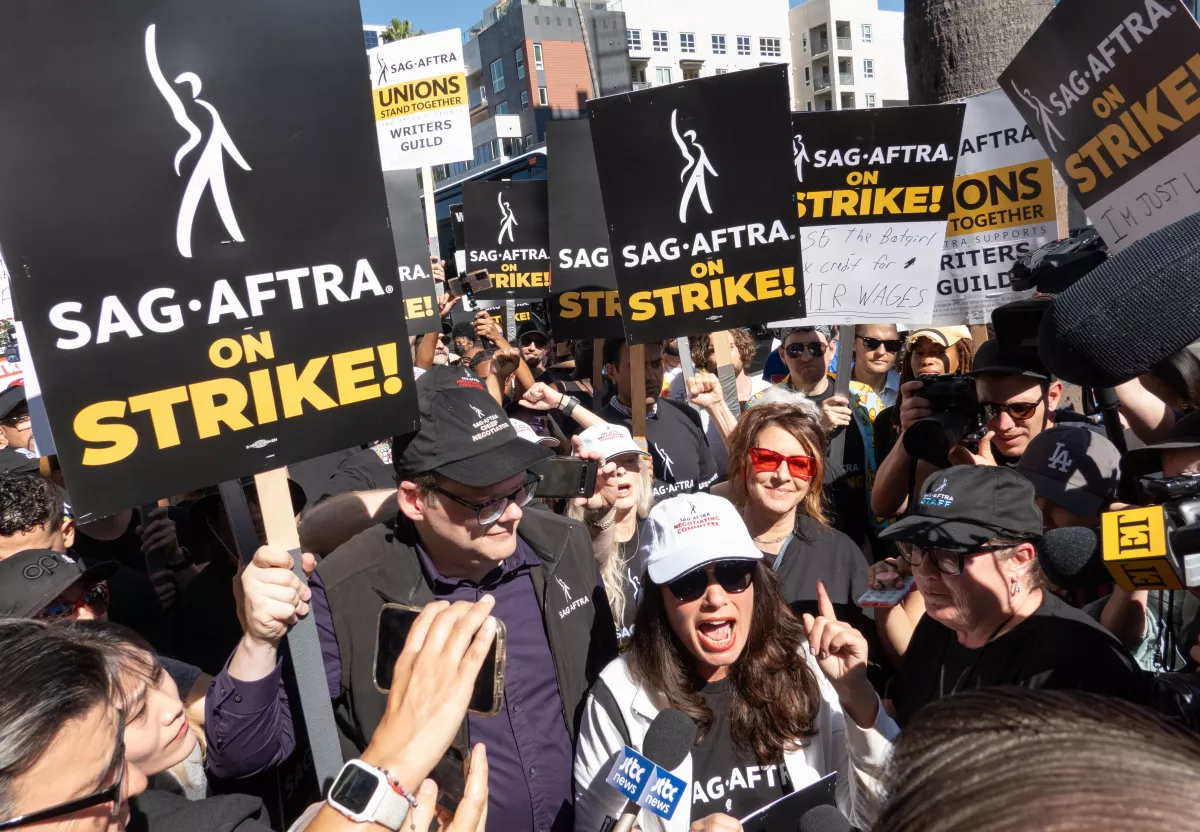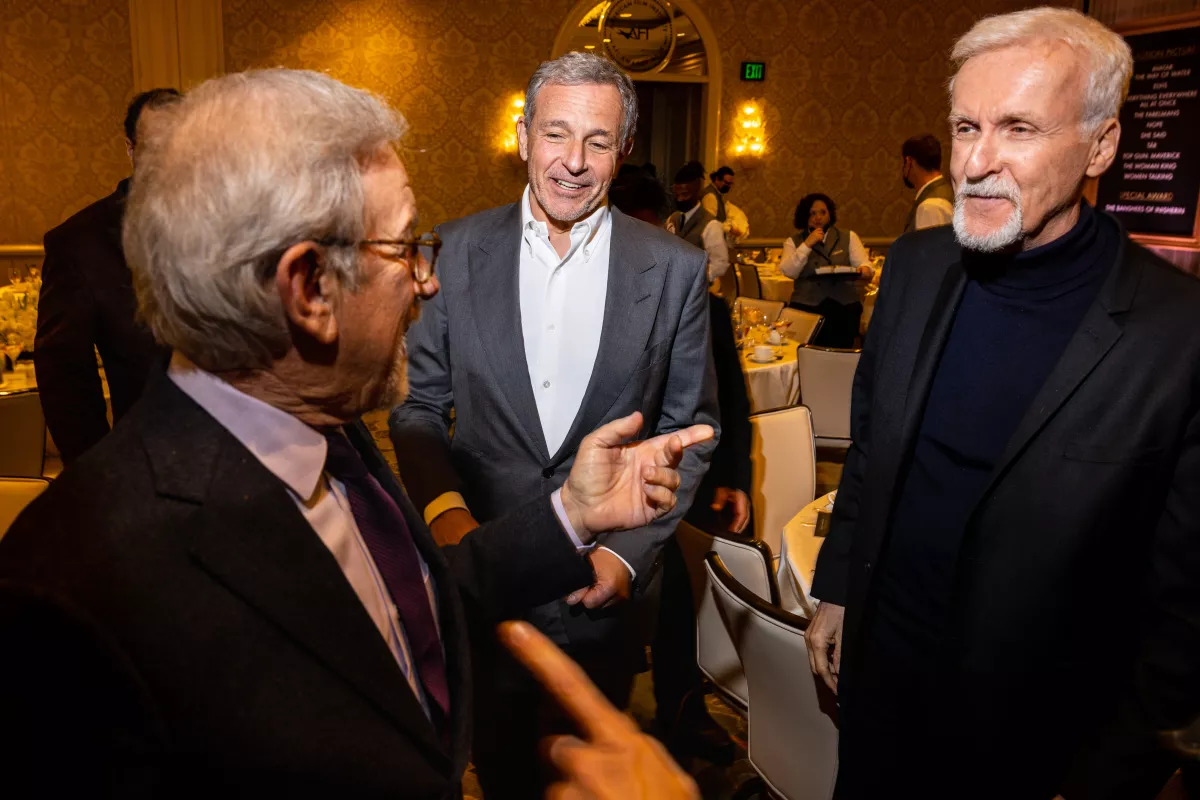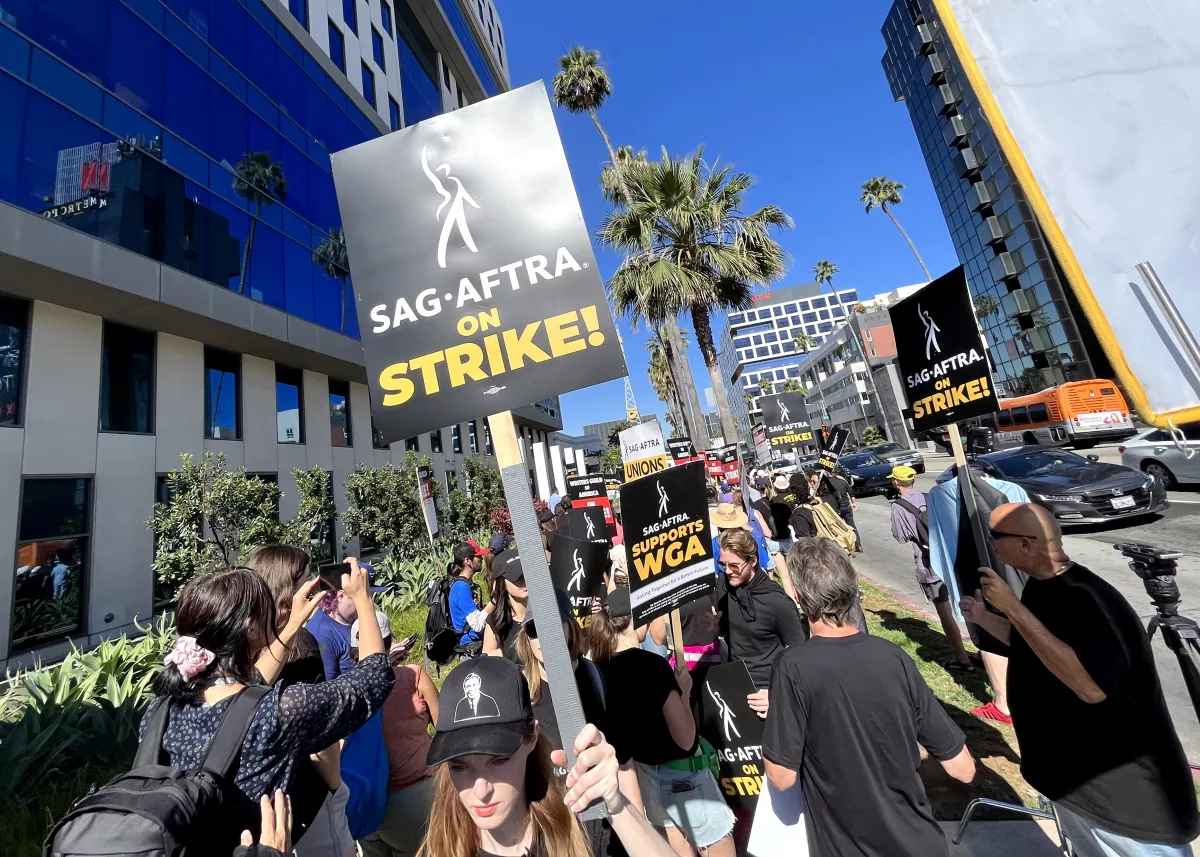Hollywood top executives figured they could ride out a skirmish with screenwriters reeling from technology’s changes to the industry.
But few executives were prepared for — or wanted — a strike by the industry’s largest union, SAG-AFTRA, which represents 160,000 actors and other performers.
After talks over a new contract collapsed last week, throngs of performers joined writers on picket lines — plunging Los Angeles’ signature industry into chaos and further complicating what some fear could become a long and devastating strike.
Movie shoots have ground to a halt. A-list stars have bailed on film and TV marketing campaigns. Matt Damon, Cillian Murphy and other actors walked out during Thursday night’s London premiere of Universal Pictures’ highly anticipated “Oppenheimer.”
The upcoming fall TV season could sputter, devoid of new scripted episodes of “Abbott Elementary,” “Law & Order: SVU” and “NCIS.” And media companies that were already struggling to compete in the streaming era could see their fortunes further sink.
“There’s going to be a lot of blood in the water,” Jonathan Taplin, director emeritus of USC’s Annenberg Innovation Lab, said. “This is not going to end well.”
Simultaneous strikes by the Writers Guild of America and the Screen Actors Guild-American Federation of Television and Radio Artists — the first joint work stoppage since Ronald Reagan led SAG in 1960 — couldn’t come at a worse time for traditional entertainment companies.
Their businesses haven’t fully recovered from pandemic shutdowns. Walt Disney Co., Paramount Global and Warner Bros. Discovery have been grappling with heavy debt loads due to mergers, and also from ordering dozens of shows to ramp up their streaming services. All the while, linear broadcast and cable TV networks have witnessed a precipitous slide in viewers to Netflix and other streaming services.
“The economics of the industry are very challenging — the worst that we’ve ever seen,” veteran media analyst Michael Nathanson said. “A prolonged strike will only make things worse.”
Amid a nationwide rise in labor activity, Hollywood’s discord has taken on the trappings of a larger cultural clash, ostensibly pitting everyday workers against top wage earners, America’s 1%.
On picket lines and social media sites, richly compensated industry leaders, including Disney Chief Executive Bob Iger and Warner Bros. Discovery Chief David Zaslav, are being portrayed as cartoon villains.
Outside Disney’s Burbank headquarters on Friday, a striking worker hoisted a sign that depicted Iger’s face superimposed on a hand-drawn Marie Antoinette figure, holding a raspberry-colored confection under the words: “How about sharing some of that cake, Bob?”
“We’re looking at class warfare,” Nathanson said. “It’s become more than just about their work agreements, but also about statements they want to make about society and fairness. Working-class people are looking to take their anger out on the studio executives.”

SAG-AFTRA President Fran Drescher, best known for starring in the 1990s sitcom “The Nanny,” has been celebrated among striking workers after her rousing speech Thursday to announce her board’s unanimous vote to call a strike against the Alliance of Motion Picture and Television Producers, the organization that negotiates on behalf of the media companies.
Actors are seeking higher minimum pay, increased residuals and revenue sharing with the streamers. They’ve demanded protections against the use of artificial intelligence to simulate background actors, known as “extras.” Writers have made similar demands, saying since the rise of streaming, midlevel writers have struggled to make a living wage.
“The entire business model has been changed because of streaming, digital and AI,” Drescher said. “At some point, you have to say ‘no, we’re not going to take this anymore.’”
The AMPTP defended the offer the group had made to actors, including what it said was the highest percentage increase in pay minimums in 35 years and a “groundbreaking” proposal for AI protections.
“A strike is certainly not the outcome we hoped for as studios cannot operate without the performers that bring our TV shows and films to life,” the AMPTP said. “The union has regrettably chosen a path that will lead to financial hardship for countless thousands of people who depend on the industry.”
It’s not clear when bargaining sessions with the actors might resume. No talks are currently scheduled.
AMPTP negotiators haven’t met with the WGA in more than two months.
Taplin, a former film producer who wrote a book about artificial intelligence, “The End of Reality: How Four Billionaires Are Selling Out Our Future,” said the threat posed by technology “for all artistic production is gigantic.”
“People worry, in the abstract, about AI replacing workers but here it is, it’s actually happening,” Taplin said. “They don’t want to have to pay for extras anymore, so they could have a scene that has 5,000 AI extras in the background.”
Technology also has upset Hollywood’s hierarchy. AMPTP’s shifting makeup now includes tech giants Amazon, Apple and Netflix — companies that don’t have a tradition of collective bargaining.
Veteran executives said the group, even in good economic times, formed an uneasy alliance. Member companies, including Disney, Comcast’s NBCUniversal and Netflix, are more accustomed to battling one another for viewers and revenue.
And some in Hollywood have wondered whether the AMPTP’s shifting makeup will stand in the way of a deal.
When reached for comment, AMPTP spokesperson Scott Rowe said: “The companies remain completely united.”
But unlike past strikes, including the 100-day standoff between writers and studios in 2007-2008, no leading executive has emerged to help broker labor peace.
“There isn’t a leader or leaders who have volunteered to handle this and to be the focal point of the discussion,” said one person close to the negotiations who was not authorized to comment. “That’s partially because they’re all new to it, and also because 2023 is nothing like any other time when the technology has essentially changed business plans.”

Wall Street already has placed its bets, punishing the stocks of legacy media companies.
Since the writers’ strike began in May, Disney’s stock has fallen 13% to $88.62 a share. Paramount has dropped more than 30% to $15.96 a share, and Warner Bros. Discovery has declined nearly 7% to $12.40.
Shares of WBD, which owns HBO and CNN, closed at $12.40 on Friday, down nearly 50% since April 2022 when the smaller Discovery absorbed WarnerMedia — a deal that saddled the company with more than $45 billion in debt.
In contrast, Netflix shares have soared 36% to $441.91 since the writers’ strike began.
Netflix now boasts a higher market value — nearly $200 billion — than Disney, the world’s largest entertainment company, which is valued at $162 billion.
“Investors are saying Netflix can weather the storm,” Nathanson said. “They make a lot of shows, and stack them up because of the binge-viewing model. They also have a lot more international production that they can import.”
Disney’s boss, Iger, appeared on business channel CNBC last week from the annual media mogul conference in picturesque Sun Valley, Idaho. The executive, who returned to the company in November, acknowledged that he underestimated the challenges confronting his company — particularly in the traditional television business.
“The disruptive forces that have been preying on that business for a while are greater than I thought,” Iger said. “We have to come to grips with that.”
Disney already has slashed nearly 7,000 jobs this year in an effort to save $5.5 billion. And in a nod to the changing winds, Iger suggested Disney might consider shedding linear channels, perhaps even the ABC television network.
The company, he said, also is open to taking on a strategic partner for ESPN.
Disney’s sports empire remains lucrative, but it is plagued by the trend of consumers ditching cable and satellite subscriptions in favor of streaming apps. At some point, the company plans to offer ESPN directly to consumers — but Iger didn’t say when.
“We’re seeing accelerated cord cutting as people are dropping the cable bundle,” Nathanson said. “And advertisers are no longer supporting the networks as they have in the past.”
Broadcast networks — ABC, CBS, NBC and Fox — are expected to be hit hard by the twin strikes because they are most reliant on fresh programming. Late-night comedians, including ABC’s Jimmy Kimmel and CBS’ Stephen Colbert, have been off the air since early May, when the writers’ strike began.
If the two walkouts are not resolved before October, there probably won’t be any new scripted shows produced until next year, according to company insiders.
And that could be devastating at a time when traditional networks are struggling to hold on to viewers.
“The networks have sports and news but a lot of their constituents are there to watch the prime-time shows,” said Neil Begley, a senior vice president for Moody’s Investors Service. “Among those viewers, there’s an expectation that fall is the start of the new season. The networks are going to have to reach far and wide for content to fill those hours.”
Compounding matters, this year’s annual TV advertising market, when TV networks sell their commercial time for the new season, has been sluggish.
“Advertisers don’t know what type of programming they’re going to get with these strikes,” Begley said. “They’re saying: Why commit?”
Privately, company executives say their businesses won’t feel much financial pain for several months. Without widespread production, costs will be lower, which translates into higher profits — at least in the short term.
Studios also are expected to begin canceling TV writers’ overall deals to find more savings.
But eventually, networks and streamers will run low on original episodes and media executives will be motivated to reach a detente.
“You can’t get by without actors,” Begley said. “The actors’ strike gave more leverage to the writers.”
Analysts and veteran executives said the market is straining to support all of the streaming services — and shows to stock them — launched in the last five or so years. Hollywood, they say, could look dramatically different after the strikes get resolved.
“Consolidation is going to happen,” predicted Nathanson. “Perhaps the strike will accelerate those moves as the weakness sets in. Some of these players are going to get weaker.”
